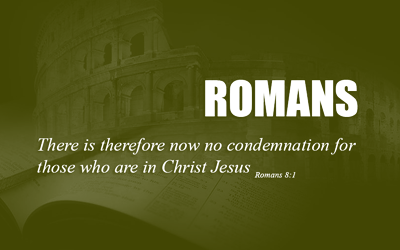Romans 4:5-13
Declaring the ungodly righteous. True blessing. Blessing apart from the law. Father of all those who believe.
(Bấm vào đây để đọc tiếng Việt)
DECLARING THE UNGODLY RIGHTEOUS
 "5But to the one who does not work, but believes in the one who declares the ungodly righteous, his faith is credited as righteousness." (Romans 4:5)
"5But to the one who does not work, but believes in the one who declares the ungodly righteous, his faith is credited as righteousness." (Romans 4:5)
Usually, we associate righteousness with godliness. We believe that righteousness belongs to those who are free from blame. The truth contained in this verse should shock many believers who, while believing it as a point of theology, frequently fail to truly believe it in their heart.
God “declares the ungodly righteous.” How is this possible? This is a question that many people, including the Pharisees, ask after hearing Jesus’ teaching “11The Pharisee stood and prayed thus with himself, God, I thank thee, that I am not as other men are, extortioners, unjust, adulterers, or even as this publican. 12I fast twice in the week, I give tithes of all that I possess (Luke 18:11-12).” They believed that if anyone deserved to be declared righteous, it was them.
You don’t have to be a Pharisee to fall into this trap of self-righteousness. We are all prone to thinking like them when it comes to who deserves God’s righteousness. However, as stated in the preceding verse 5, God’s righteousness is unrelated to how good you believe you are.
TRUE BLESSING
“6So even David himself speaks regarding the blessedness of the man to whom God credits righteousness apart from works: 7“Blessed are those whose lawless deeds are forgiven, and whose sins are covered; 8blessed is the one against whom the Lord will never count sin.”” (Romans 4:6-8 — Psalm 32:1-2)
We have read from the Bible many declarations of “blessing”, such as:
1Blessed is the man that walketh not in the counsel of the ungodly, nor standeth in the way of sinners, nor sitteth in the seat of the scornful. 2But his delight is in the law of the Lord; and in his law doth he meditate day and night. (Psalms1:1-2)
This Psalm has served as the golden rule for many Christians as most of them, including myself, have memorized it. It is part of the liturgy of many churches for generations.
However, in Romans 4:6-8, Paul says something different. It is not such a blessing to be able to do all of the wonderful things listed in Psalm 1. It is a greater blessing to be forgiven because you will inevitably fail to follow the golden rules. The lives of King David, Abraham, and other biblical heroes demonstrate this. King David may have been enthusiastic when he wrote Psalm 1, but as time passed and he failed repeatedly, he penned the verses that were later quoted by Paul to demonstrate the true blessing of being forgiven rather than being able to keep even one aspect of the law.
Perhaps the verses Christians should meditate on are not Psalm 1, but Psalm 32, when King David stopped looking within himself to uphold the law and instead looked to the Lord, who could save him from his own destruction. On the other hand, everyone must go through Psalm 1 before they can reach Psalm 32. They must strive to fulfill the law to the best of their abilities before surrendering at the cross. That has been my own experience.
BLESSING APART FROM THE LAW
“9Is this blessedness then for the circumcision or also for the uncircumcision? For we say, “faith was credited to Abraham as righteousness.” 10How then was it credited to him? Was he circumcised at the time, or not? No, he was not circumcised but uncircumcised!”” (Romans 4:9-10)
The timing of Abraham’s righteousness is used by Paul to show that it is imputed to him without the requirement of obedience to the law. When Abraham’s righteousness was credited, “he was not circumcised.” If he had already been circumcised, one could argue that the law was a necessary ingredient. He was not, however.
This truth was already stated by Paul in Chapter 3, but it appears to be significant enough that he repeats it several times in Romans.
21But now the righteousness of God without the law is manifested, being witnessed by the law and the prophets; 22Even the righteousness of God which is by faith of Jesus Christ unto all and upon all them that believe: for there is no difference: 23For all have sinned, and come short of the glory of God; 24Being justified freely by his grace through the redemption that is in Christ Jesus: 25Whom God hath set forth to be a propitiation through faith in his blood, to declare his righteousness for the remission of sins that are past, through the forbearance of God; (Romans 3:21-25)
FATHER OF ALL THOSE WHO BELIEVE
“11And he received the sign of circumcision as a seal of the righteousness that he had by faith while he was still uncircumcised, so that he would become the father of all those who believe but have never been circumcised, that they too could have righteousness credited to them. 12And he is also the father of the circumcised, who are not only circumcised, but who also walk in the footsteps of the faith that our father Abraham possessed when he was still uncircumcised. 13For the promise to Abraham or to his descendants that he would inherit the world was not fulfilled through the law, but through the righteousness that comes by faith.” (Romans 4:11-13)
So, if you come to God through faith in Christ, as Abraham did, he is your father in a sense.
Don’t underestimate the law’s power and allure. It tempted Adam and Eve, causing them to lose their eternal life. The law, in contrast to the fruit of the spirit, only brings death, as we will see in Chapter 7.
5For when we were in the flesh, the sinful desires, aroused by the law, were active in the members of our body to bear fruit for death. 6But now we have been released from the law, because we have died to what controlled us, so that we may serve in the new life of the Spirit and not under the old written code. (Romans 7:5)
Nghi Nguyen
- Scripture quoted by permission. All scripture quotations, unless otherwise indicated, are taken from the NET Bible® copyright ©1996-2006 by Biblical Studies Press, L.L.C. All rights reserved.
Disclaimer: This is my own opinion on the topic, which does not necessarily reflect the church's theology, or beliefs of the individuals in it — Nghi Nguyen
